Sickly in Sudan
(Marie-mail #62)
GONDER TO SHIHEDI, ETHIOPIA
NOVEMBER 15
I had pre-booked a taxi for 5:30. It didn't show up, and I left the Circle Hotel for the early morning darkness with some trepidation.
Fortunately, share taxis were lined up at the town roundabout. Nothing else was open that early - they were all bound for the bus park. And they cost ten birr less than the private taxi I'd negotiated with the night before.
As the "faranji," or foreign guest, I was given early access through the gate to the bus park. The waiting throngs smiled at me cheerfully. They didn't mind that I got to cut ahead of them in the rush for the bus. They knew I was incapable of fighting through the crowd of experienced shovers. What they didn't know was that I was doubly incapable, as I was suffering from bruises, chest pain, and assorted aches as a result of an Isuzu accident. I was barely able to carry my pack, much less fight my way through a seething mass.
"Are you going to Sudan from Shihedi?" asked the bus conductor. I was obviously not the first tourist to come this way.
I nodded. Shihedi was forty kilometers from the border town of Metema. Rumor had it that Shihedi had a decent hotel, but that there was "nothing" in Metema. The conductor nodded and dragged me over to a "white man" who had come from Metema the day before.
The "white man" turned out to be a Japanese backpacker. He told me there were simple hotels in Metema, and that I needed to go there as it would take me "several days" to catch a lift north to Gedaref, the first major town in Sudan. I was worried, as I didn't have "several days." But he might be wrong, I thought. Maybe he was just unlucky on his ride south. But I had to consider what he said. No published guidebook even mentioned this route, and the only info available was from other travelers, both live and on the internet.
The Ethiopians advanced on the bus park, and soon we were three to a seat. The young man sitting next to me, quiet at first, bought some kolo from a girl and offered me some. It was a small chunky grain that tasted like burnt popcorn.
He turned out to speak fluent English, and had learned it from a missionary in Sudan when he'd been a refugee there. During the Ethiopian civil war and war with Eritrea, many refugees had been sent to Sudan, including my mother's foster daughter. Sophie had remained in the States and trained as a nurse, but some Ethiopians had returned to Ethiopia once it was at peace.
"Stay in Shihedi," said the young man, who made frequent trips to Shihedi to show videos for a small admission fee. "The hotels in Metema are not suitable. At eleven tomorrow morning, catch the Isuzu to Metema. It is only one and a half hours. At Metema, catch a lorry to Gedaref, where there is a paved road and a fast, new bus. You could be in Khartoum tomorrow night."
I knew that eleven Ethiopian time was 5 a.m. by my standards. Ethiopians measure the day from daybreak, so their one is our 7 a.m. And I knew that a lorry was British English for a truck, and I also knew that it was quite improbably that I would be in Khartoum that easily and quickly. Nothing in East Africa went as smoothly as the man described.
The bus trip to Shihedi was over a bad but not intolerable road, and while hot, it was only six hours. I laughed at how my standards had changed. Six hours was a walk in the park compared to a lot of trips I took in 2001.
A Metema-bound bus waiting at Shihedi, but I went with local advice and checked into the blue and pink hotel behind the bus park. I was lucky to have help - the building had no sign and didn't look like a hotel.
"It is the best hotel in town," said my self-appointed guide. "It has a good shower." He left me in a small cement cell with a single open window. There was no blanket, but I was still carrying my sleeping bag. The shared shower was all right. I ordered an Ambo, Ethiopia's superb brand of seltzer, and settled into the hotel's front room to listen to Shihedi.
The click of a pool que on balls came from next door. The Xena: Warrior Princess war cry came from nearby, probably indicating a sporting event was on, or the girl's choir was practicing.
Ethiopia had been all right in the end. It had as rich a culture as anywhere I'd ever been, and the annoying wanna-be guides were less irritating than those in Egypt or India. In spite of my near- death experience of 34 hours prior, I was happy to be here. The shocking purple-black bruises on my left knee and thigh reminded me of a certain gearshift as well as of my fantastic luck to date.
Still, it was time to move on. Ramadan started in two days, and I needed to get to Khartoum before the Muslim world shut down.
SHIHEDI TO GEDAREF
NOVEMBER 16
I was getting conflicting information about getting to Metema. Yesterday, I'd heard that if I got up at five, I could catch an Isuzu truck to the border. Then last night I'd met a man who drove the Metema bus. He was leaving at 8. Great. I preferred buses to risking my life in a big truck. The problem was that I was also petrified of missing a ride. What if I got to the border after the trucks bound for Gedaref had left? I'd waste another night sitting in a cell instead of moving on to Khartoum.
To cover my bets, I awoke at 5:30 and asked the hotel guard about Metema. "Isuzu? Autobus? Metema?" I pointed to my watch. He'd responded with something I couldn't understand and indicated the bus driver was still asleep two doors down from me.
I sat in my dark cell and turned on my flashlight, since the electricity was out. It made sense, I reasoned, that when the bus went to Metema during the dry season, the Isuzus would not. Everyone was forbidden to compete with the government bus, and even if the Metema bus was private, there wouldn't be enough passengers to merit both buses and trucks.
A movement at the window caught my eye. The guard was silently watching me.
"Metema, blah blah," he said in an urgent tone, making driving motions with his hands. I grabbed my luggage and followed him to the Metema bus. They let me carry my bag on instead of putting it on the roof.
The same driver I'd met last night hopped in.
"Good morning, Mah-ree," he announced cheerfully. "Late!"
From this, I concluded when he'd told me eight, he'd meant six, as it was now only 6:10. But I'd confirmed by asking the Ethiopian time. He'd said two.
As usual the answer was provided shortly. We drove to the center of town and parked. The Metema bus left at eight from the town center. I sat back and waited to see what nonsense or excitement fate had in store for me today.
As usual, I was assaulted by kindness. Little girls hooted and waved, nice men came by to try out their English and my Amharic, and as usual everyone stared gleefully.
We left at 7:30, with me at the front of the bus demonstrating my newfound mastery of Amharic with my phrasebook. We drove through tiny mud hut towns, smaller and more remote than anything else I'd seen. Just before nine we pulled up to Metema, a metropolis of huts compared to the villages we'd passed. The bus staff pointed me to Immigration, where after stamping me out, the official asked me to write comments on a piece of torn paper, and proceeded to drop them in a box. He then arranged for my 74 Ethiopian birr to become Sudanese dinar, but wouldn't give the money to me until I crossed to the Sudanese side.
A man led me to Customs, where a uniformed fellow listlessly ruffled through my pack. It was then a hot walk into Sudan. Others hired carts with donkeys to carry their bags.
I addressed the assembled Sudanese at the border with my best "salaam aleykum." They responded with a "salaam" of their own, and look surprised but not unhappy when they saw my US passport. The Sudanese let me in, and pointed to a truck that was leaving at noon. With a bit of luck, I really could be sleeping in Khartoum tonight. I put on my Ethiopian scarf, covering my head and shoulders and giving the Ethiopians who were crossing the border with me a kick.
The truck, of course, either left early or left and came back. I had no idea what time it was. Sudan was probably on "normal" time, but I had didn't know what time zone we were in.
I changed money with a shady shopkeeper and had a Pepsi before returning to stare at the newly arrived truck. Would it take us to Gedaref? Would an immense feast await me, tomorrow being Ramadan?
At 2:30, the truck returned. There was movement and all the cargo went on. The two Ethiopian women I'd been running parallel to snagged the two front seats, leaving me and my bruises to climb into the back with one Ethiopian man and 40 Sudanese. I plopped down on top of my backpack and paid 2500 dinar for the privilege. The Ethiopian paid the same foreigner price that I did, whereas the Sudanese all paid 600 dinar each.
My comfort was short-lived. More cargo came on, including a bag of charcoal that landed on my feet. More Sudanese piled on to where there wasn't an inch of space to move in.
Fifty hours after being in an overturned cargo truck, I was back in the same risky circumstances, with no alternatives. And this time I wasn't even in the cab, but in the hot "seat," crunched in between sacks of grain, charcoal, garlic, and a mother with a dehydrated, listless baby. "This is mad," I thought. "I'm never doing this again." It was a hollow promise to myself, as I would have no more opportunities in 2001 for this sort of travel.

piled in the back of a Bedford truck
Every time we hit a pothole or bump, I (along with everyone else) was airborne. Upon landing, my bruised ribs ached and complained. A knee was in my back, a crotch by my ear and god knows where I was putting my hands. My behind was wedged in between two sacks and my underwear stuck out for all to see. So much for Muslim modesty, I thought.
Every time someone whistled for a halt and climbed over the side to disappear, the remaining passengers shifted, angling for better position. My butt was freed from its tight spot and regained the seat on my backpack. I was able to negotiate the knees out of my back, and was lifted to an even better vantage point after almost squashing an infant. More passengers got on at each stop, but they couldn't budge the veterans. We determinedly stuck to our hard-earned perches.
The point of departure of an overloaded Bedford truck, I noticed, was much higher than the point of departure of an overloaded Isuzu. We didn't crash, in spite of tilting precariously in all directions (yes, this scared me out of my wits).
One man pouted when his bag of garlic burst open. Garlic bulbs spread everywhere, so I supplied him with a green plastic garbage bag from Kenya, complete with pull-tie. I was carrying a few in anticipation of a dusty train ride through northern Sudan. He couldn't open it, so I showed him how and then pulled out the ties for him. The group giggled and looked admiringly at the garbage bag.
One Muslim man dressed in a long white cotton robe and hip sneakers made it his business to keep me grounded and pushed me down every time I seemed likely to fly away. The ride was absurd.
"They call this a road?" I thought, wincing from the sharp pain in my ribs as I landed on my pack again. The locals giggled and grabbed for handholds. The mother with the listless baby tried to give the child water and winded up dousing the infant.
My Axum scarf was useful. I covered my face, and kept the dust out of my mouth, as well as amusing the other passengers -- if you could call them that. We were really just living cargo, not too different from a truckload of cows.
But the scarf may have reached the end of its usefulness. I would never get all the dust out of it, and would have to switch to my old black Iran scarf.
We banged and clattered along our filthy way for ninety kilometers. It took five hours. We were lucky. In the rainy season, the same trip had taken Australian writer Peter Moore three days. Ted Simon, in his book about riding a motorcycle around the world, said the same road took him "to the verge of despair, and then turned to laughter. It was too ridiculous."
Finally, battered and dazed, we disembarked at a small outpost town (possibly called Doka). The Sudanese food looked interesting but not inviting -- piles of bony meat eaten with flatbread. I found a fruit vendor and bought a yellow thing that turned out to be a rich grapefruit, and ate it along with sugary tea provided by a surly seller.

Mr. Worldly and Mother eat fuul in Gederaf's Ethiopian Compound
The Ethiopians invited me to join them, and supplied me with a hot tea that tasted more of soap than sugar.
"Honk honk!" It was the international signal for "get on board," so I downed the scorching hot soapy tea (at the Ethiopian's insistence) and bolted for the steep climb up the Bedford's rear gate.
The Sudanese passengers had kindly rearranged the cargo so that if I sat on my backpack and held the top like a bucking bronco, I would be more or less secure and probably wouldn't fly away. My aching chest, however, did not improve.
Darkness had fallen and from my perch with a Sudanese woman's arms on my thighs and an Ethiopian man using my wristwatch as his own, I stared at the stars. My friends the Sudanese didn't care that I was American, or that the US had just renewed sanctions against them for a year for possible slavery in the South. We were all in the filthy, bumpy, hellish stew together.
At nine, someone poked me and uttered "Gederaf." Up ahead were the lights of a small city. I was paranoid -- the last time I'd breathed a sigh of relief on the outskirts of a town, I'd ended up parallel to the grass.
The road temporarily turned to a hopeless dirt track, and just as I was wondering if Sudan had a landmine problem, we hit the first mud huts of Gedaref.
As far as I knew, there wasn't a guidebook to Sudan. Certainly, if there is one, I had not stumbled across a copy. So I had no way of knowing if there was a decent hotel in Gedaref, and had only brief notes of Sudan at all, hastily copied out of Marinko's Africa On A Shoestring back on the TAZARA train. I opted to go with the flow, leaving the truck when I was instructed to, and docilely letting the Ethiopians usher me into their chosen accommodation.
I'd been hoping for a long shower. Instead, at the "Ethiopian Compound," I got a pitcher of water. "Mother," the older Ethiopian woman (all Ethiopians seem to call older women "mother") insisted on pouring the water over my head while I scrubbed. We couldn't communicate at all -- she spoke Tigre and my limited Amharic was useless. She'd talk to me in sign language -- she showed me when she liked something by patting her chest, told me to put on sleeves by motioning to my wrists, and let me know when I could take off my headscarf by tugging at it.
The Ethiopian Compound featured a fenced-in yard with pit toilets in one corner. They yard held a dozen metal frame beds with thin mattresses, and Ethiopians slept in the beds in their own sheets. A few had thought to bring mosquito nets.
"That's odd," I though. "There aren't any mosquitoes here." I was soon to learn that the compound was crawling with fleas, gnats, bedbugs, and flies.
The proprietress originally tried to turn me away, but a few words from my travel companions had me inside the gate. The man traveling with us, a worldly fellow who was on his way to work with his brother in Port Sudan, was given a bed in the yard. The three women, including myself, were given two beds in a cement room. The two Ethiopian women crawled into bed together, sleeping head to toe, while I was given my own metal bed to stretch my sleeping bag out on.
A boy escorted me to a nearby shop, where I bought a two-liter bottle of water. Everyone else made do with water from a barrel in the compound.
I supplied Wet Ones to my co-travelers. Two of the three followed my example, wiping the thick grime off our arms and faces. The third, a sweet young Ethiopian woman I'd been mentally referring to as SYEW, carefully put hers aside for later only to be surprised when it was dry.
Dinner was served -- fuul with flat bread. Fuul is a spiced bean and cheese dish. I ate more bread than fuul, but pretended to down massive amounts of both. Now was not the time to discuss my dairy sensitivity.
Finally, after a cup of sugary tea, it was time for a well-deserved rest. I crawled into my sleeping bag, changed my clothes there using the clothing acrobatic skills girls seem born with, and tried to sleep.
The Ethiopians seemed oblivious to the onslaught of perky insects, but I managed to kill several of them throughout the night by slapping my forehead.
Finally, it was time to stop pretending to be asleep. We had to get up early to apply for travel permits.
GEDAREF TO KHARTOUM
NOVEMBER 17
Breakfast was served! Grainy, crunchy injera bread and a pile of spicy red mush was our meal, which I ate slowly. If I were lucky, it would all be consumed by others before I had to take another bite.
Then, a problem. Travel permits required photos. I had mine, SYEW had hers, and so did Mother. But Mr. Worldy had none. He ran off to track some down.
A middle-aged man with white hair held a baby girl in one hand and a shortwave radio in the other. He tuned to the BBC World Service, and watched my reaction through his peripheral vision.
The Taliban had left Khartoum, and one of Bin Laden's most important lieutenants was dead. Everyone seemed relieved -- they were more interested in a quick end to the world's problems than in any vengeance for America's sanctions or "arrogance."
Ethiopians in general, it seemed, were pro-American. Everyone I'd met in every country had been appalled at the loss of life in the World Trade Center. Four Ethiopians had lost their lives in the disaster, and Ethiopia had taken it to heart. But what reaction would I get from the Sudanese?
The middle-aged man spoke fluent English. He'd been in Sudan for twenty ears, and was no doubt originally a war refugee. He spoke eloquently about Sudan's problems, its war between the fundamentalist Islamic government and the southern Christian separatists. Sudan is the largest country in Africa, and many Southerners would like to split it in two.
If Ethiopia was Africa's India, I was discovering, Sudan was surely its Pakistan. The wild, chaotic, creative and permissive atmosphere of Ethiopia had disappeared as I'd crossed the border, to be replaced by orderliness, paperwork, a hard-line government, and the ever-present call to prayer.
I was getting anxious, as Mr. Worldy had still not returned with his photos Just as I was about to suggest leaving without him, Mother and SYEW strode over.
They said something in Tigre, which seemed to be "c'mon, we're leaving."
I paid my lodging bill of 150 dinar and dutifully followed my new friends out of the Ethiopian Compound and onto the alien streets of Sudan.
They didn't seem forbidding. Soldiers pointed us in the right direction, and no one screamed "faranji" or "youyouyou" at me. We proceeded through the bright, hot morning, eventually stumbling onto Immigration.
Easy enough, I thought. But it wasn't. Sudan was big on paperwork and method, and it took me four and a half hours to acquire permission to travel.
I was the lucky one. SYEW finished at the same time, but stayed behind to help Mother through the system. Another woman who finished concurrently ran out of funds and her passport was kept locked away until she could come up with the necessary capital.
First we had to see the man in the front office. Everyone put their passports in a pile on his desk. We sat waiting nearby.
The official picked this time to have a long argument with an applicant's brother. He closed his windows and doors -- not that it made a difference -- and yelled at the brother for ten minutes.
"He is angry that she has brought her brother. You cannot rush this. You must follow the rules exactly. I have seen this many time," explained the Ethiopian man next to me.
We were eventually all called in one by one.
Forms were filled out. I noted with amusement that I was "Marie Ellen," as I'd been to the Sudanese embassy. Why worry about last names? I was surely the only Marie Ellen touring Sudan at the moment.
We were then all sent en masse to another office, where a hand reached out of a slot in the wall to take our passports. They were eventually returned, with photocopies and a bill for 200 dinar each. After paying our bills, we went back to office #1, where more forms were filled out. We each individually visited office #2, to pay a tax and receive a receipt. Back to office #1.
Now it was time for a visit to the recording secretary, on the next city block. The official in charge instructed a random Ethiopian to accompany me, as it was unmarked and difficult to find.
The recording secretary dutifully noted that one Marie Ellen from America was going Gedaref-Khartoum-Meroe-Wadi Halfa. I was sent back to Office #1 with a new pile of paper.
More notations were made and I was led to the payment officer. After 40 minutes of waiting for the clerk to appear, I became demanding so a helpful guard went and tracked down the clerk, who extracted another 4500 dinar from me. Then it was back to Office #1 where I was presented with my passport and sent on my way.
I walked nervously back towards the Ethiopian Compound. The sun was merciless and my headscarf -- black had seemed glamorous when I'd bought it -- was steaming hot. If I got disoriented or lost, I realized, I had no idea what to ask for. The Ethiopian Compound had no sign, and just looked like a tin door and wooden fence from the outside.
I needn't have worried. The Ethiopian Compound was right where I'd left it. Those inside helped me put on my backpack and tracked down a taxi for my ride to the "autobus" station.
One of the Ethiopians was cooking lunch, even through it was Ramadan. She showed me her crucifix by way of explanation, and made a dismissive gesture while saying "Ramadan."
"Christian," she said, pointing to herself. "You?"
"Nothing," I responded. She frowned, confused. No one in this part of the world was godless.
The taxi took me to the bus station. Gedaref was a larger city than I'd realized. There was even a genuine hotel or two, although I wouldn't have traded my Ethiopian experience for a hot shower.
My taxi driver took it upon himself to designate how I should get to Khartoum. He chose "Alahambiri" bus lines, and deposited me on a large, new, purple luxury bus. The ticket seller escorted me to a central office where the details of my passport were recorded.
I climbed onto the bus, sweating, and tore off my headscarf. It wasn't really expected that infidels cover their heads, but all the local women did, so I was trying to be polite. But it was damn hot under that scarf.
The air conditioning kicked in along with a recording of the Koran. We left the bus station, stopped again to show my passport and started up the 400 kilometer paved road to Khartoum.
The bus attendant held onto my passport, as he had to show it to police at occasional checkpoints. Once them made me get off the bus and accompany them.
Staring out the window as the parched desert landscape whizzed by, I saw the typical signs of an unindustrialized country. Donkeys pulled carts to the rivers, where women filled up barrels with water. Rural residents were decked out in "Titanic" t-shirts -- someone must've given a massive inventory to charity. Mud huts dotted the desert. But, surprisingly, so did telephone poles and electrical wires.
At six, bus attendants handed out dinner trays. I stared at mine, mocking me beneath its plastic wrap. I hadn't eaten a proper meal in days. I'd had some chickpea mush and injera the night before yesterday, and a peanut butter sandwich yesterday morning. But it was Ramadan and the sun was still up. I'd have to wait. "For god's sake," I thought, and then laughed at my choice of words.
Finally, just before 6:30, there was movement. Grinning at my attempted holiness, the Sudanese man next to me nodded permission. I could eat now.
And I did, tearing into my bread and chicken with drama and gusto. My standards had changed over the past eleven months, and bus food seemed quite appealing.
Just before seven, we pulled into a disorganized huddle of shacks and small buildings. This was the edge of Khartoum, itself merely a larger collection of huts, shacks, and cement blocks, albeit mixed with a few embassies and luxury hotels.
"Danah Hotel," I told a taxi driver. I'd made a note of the Danah a long time ago.
"Five thousand dinar," said the driver. I looked at him in horror. He pried 500 dinar from my hands and waved good-bye.
The Danah was friendly enough. The clerk was versed in passable English. The rooms had telephones and CNN. The showers, while not hot, were not freezing. I happily stood in one, letting the cold water rinse away the filth of Ethiopia and the Sudanese desert.
KHARTOUM
NOVEMBER 18
Nor surprisingly, there was not breakfast at Danah. I got up before sunrise, to eat Ramadan to the table, but no one else -- including the cook and hotel staff -- was up.
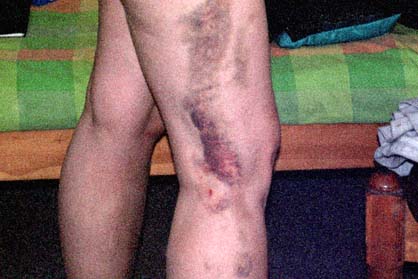
trophy from an Isuzu accident
I looked at my room, with its uninviting shower and lack of a toilet seat. I was tired. My left side was covered in massive black and purple bruises from the Isuzu accident, and my ribs ached. I was hungry. I packed my bag and took a taxi to the Hilton, where I splurged on a room at rack rate.
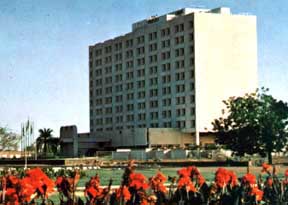
Khartoum Hilton promotional postcard
It wasn't bad. From my window, I could see the Blue Nile, which originated back in Bahir Dar, Ethiopia. If I craned my neck and peered left, the White Nile (originating in Kampala, Uganda) was visible. The convergence of the two was on the other side of an island. Palm trees lined the boulevard next to the Nile. I ate the Hilton breakfast buffet at the unholy hour of nine, and relaxed in air-conditioned comfort. I could be in any luxury hotel -- San Diego, Cairo, or even Canton, Ohio. Reception gave me a coupon for a welcome drink.

Hilton looks out on the Nile
"It doesn't have alcohol, does it?" Id' asked the waiter. He laughed. Duh, I thought, Sudan is a dry country.
I took a taxi to the train station, to inquire about times. The news wasn't good. My plan was -- and I'd bought the necessary permits from the Department of Antiquities for $20 -- to take an early morning bus to Meroe, see the pyramids, then catch the train at Atbara. I'd continue on for the 40 hour train ride to Wadi Halfa, where I'd catch the ferry to Egypt.
"That is impossible," declared the travel agent at the train station. "The train leaves Atbara at three, and it is six hours from Khartoum to Meroe by bus."
He was right. I'd been counting on the train leaving Atbara in the evening.
Glumly, I made a trip to the bus station to see about getting to Meroe today. But my Arabic was too limited, and I ended up at the wrong bus station. A taxi took me back to the Hilton, where I spent an hour soaking in the bathtub. The water, clean when I entered it, was the color of milky tea by the time I left.
NOVEMBER 19
"Taxi?" asked the concierge. It was six a.m.
"Yes. To Bahri train station," I said.
"You take the train?" The concierge was surprised. The Sudanese train system is wretched, and certainly not considered appropriate for tourists.
"Mm-hmm. To Wadi Halfa."
"He is Halfa. Halfa is a northern tribe." The concierge motioned to the cashier, who was beaming proudly.
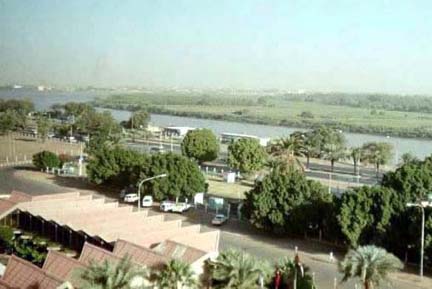
upper left of photo is where the Blue and White Niles converge to form the Nile River.
At the railway station, I bought a ticket from the travel agent I'd met the day before. Once he learned I couldn't sponsor him for an American visa (I am, after all, homeless and unemployed), he wanted nothing more to do with me.
I'd bought a first class ticket and, on the advice of Peter Moore, had brought along a dust mask and wrapped all my possessions in plastic garbage bags. The train goes through the desert at high speed, and passengers are subjected to thick dust for over fifty hours.
Fifty hours! The last fifty hour train ride had left me a shell, and nearly broken my spirit of adventure. The one before that had been rife with sexual harassment and nail-biting. I was sure I would hate this trip equally.
As usual, I got more than I bargained for. I found my first class car. It was ancient and rickety. The toilet would no doubt be just a hole in the floor.
The doors featured two sets of numbers. I opted to go with the one that had only three seats instead of six.
Surprisingly, there were no berths. A seat was just that -- a single seat. They were all covered in thick dust and were lopsided, their springs having broken long ago.

train bound for Wadi Halfa
I was the only one in my compartment and I sat down gingerly, letting the sheen of dust cover my newly washed self.
Yeah, this was disgusting. But if no one else joined me, I'd wear my dustmask, eat at will in spite of its being Ramadan, and I'd read my book. Awful but tolerable, I thought.
Then the conductor came in. I was in the wrong compartment. He marched me down the hall to the women's compartment.
There were six seats, and three adult women in addition to me. There were also three children.
I found the conductor again, and a young Egyptian man translated for me.
"There are six people already in here," I complained. "I would like a different seat."
The conductor counted the adult women.
"No, there are three in addition to yourself."
I pointed to the children. Six people. Six seats. And me. Fifty hours of this? I shook my head no.
The Egyptian kid laughed. The conductor did not. What the heck was wrong with this petulant foreigner, he was probably thinking.
"Children are people too," I complained.
The conductor walked away.
The compartments nearby had only a few men in them. Some had only one. But I, as a female, was relegated to the crowded "women and children" compartment.
"What did you expect?" said my subconscious. "Not 50 hours of sitting up in the dust while starving and listening to screaming children," I thought. The women and children smiled happily at me.
I consulted my notes. There was a 24-hour bus from Dongola to Wadi Halfa. Anything would be better than fifty hours of train hell.
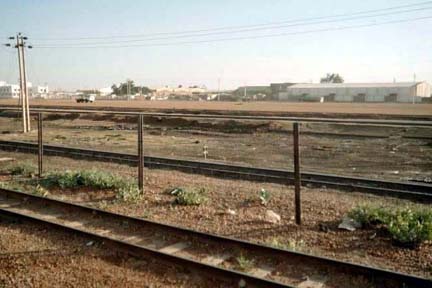
from the women's compartment
In the end, the 50 hours of train hell would have been preferable to how I spent the next two days. I had been tired and dizzy all morning, and now I could feel nausea coming on. I chalked it up to my state of mind and, wincing, put my backpack up on a rack.
Then bile rose in my throat, and I realized I was about to vomit.
I grabbed my pack and fled from the train. I sat for a minute, sipping water even though it was Ramadan. I was off the hook anyway -- the rules don't apply to travelers or sick people. Then, knowing I was feverish and dreadfully ill, I threw away my train ticket and caught a taxi back to the Danah Hotel. The man behind the desk took a look at my pale, alarmed face and urgently shoved a key at me as involuntarily spasms shook my throat.
I spent the rest of the day vomiting in a shabby hotel room in Khartoum, in front of CNN. Occasionally, I woke up from my delirium, watched a little Colin Powell or Yassar Arafat, and then tried to nibble on one of the snacks I'd packed for the train. The snacks soon found their way into the seatless, leaky toilet in the next room, which was better than the sink I had only made it to on my initial run.
After dark, I stumbled down the stairs to the shop next door and bought some water. A Sudanese grandfather spoke German to me, and invited me to join him when I told him I was traveling alone.
"Please," he said. "Come here to eat. You should not eat alone."
"I am sorry," I said. "I am sick. Ich bin krank." I looked miserable, so he didn't press. I wandered back to my confusing hazy world of sleep and sickness. For some reason, the Danah had given me the spinning suite. I wasn't sure what I had done to offend them.
NOVEMBER 20
I awoke with an aching stomach, painful bruises, and a chest that felt worse every time I coughed or moved.
I stumbled down to Reception.
"Can I please have some boiling water? For soup?" I carried my own instant soup.
The clerk sent me up some water, and I tentatively ate soup. I spent the next two hours attentively waiting for the soup to protest.
It didn't. Weakly, I left the Danah and went to the U.S. Consulate. Maybe they'd know a good doctor.
Officially, there wasn't a US embassy in Sudan. But there was a walled cement compound that seemed to be an offshoot of the Cairo embassy. The point of it appeared to be the processing of Sudanese visa applications.
I approached the Sudanese guard in front of the US flag and behind the massive perimeter fence. I shoved my passport at him and he opened the gate.
A female guard proceeded to thoroughly investigate everything in my bag. She temporarily confiscated my camera, Swiss army knife, first aid kid, and emery board. Another guard made a second check of my bag and sent me through a metal detector.
And I was suddenly in a different world -- a world of air conditioning, bulletproof glass and well-dressed Sudanese anxious to emigrate to the land of economic opportunity.
Unfortunately, US citizen's services extended just to registration and dire warnings to keep a low profile. I registered my presence in Sudan, obligingly accepted the warning notes, and left, reclaiming my possessions as I went. I'd find a doctor in Egypt -- after all, I hadn't thrown up in at least two hours.

Khartoum Museum courtyard. "You are our guest, you should not pay admission," said the ticket taker.
I went to the internet cafe across the street. While waiting for the server to kick in, I idly read the text a Sudanese girl next to me was typing.
"How are you?" she wrote. "Of course you are fine. You are in America."
My own e-mail contained a note from a BBC producer. "We'd like to interview you for our program about women on the road. Can you give us a call on your cellphone?"
I had to hoot at this. Cellphone? Even if all the claims of global providers were true, I laughed at the notion that Sudan would be a covered area. Still, the BBC... I e-mailed the Danah's phone number and tried not to get my hopes up.
I was blithely typing away at six, when the guy who ran the internet cafe threw me out.
"I need to pray," he explained. "That will be 7,000 dinar." I paid him 700 and he looked satisfied.
The Sudanese seemed to always add an extra zero to prices. They said 5,000 when they meant 500, and 7,000 when they meant 700. I thought it was a language problem at first, some sort of communication problem. But no, it seemed to be because their currency had been changed and no one could be bothered to use the new terms instead of the old.
The dusty streets of Khartoum were empty. Everyone had gone to mosque to pray. It was touching, this devotion to an unseen god. To my industrialized, jaded, non-religious western eyes, I confess that it also seemed a bit mad, especially when I was starving or being relegated (in my headscarf) to the "women and children" section of things, as if my primary function was the spawning and sustenance of my flawed species.
But I was lucky. As a foreign woman, I had access to certain privileges. I was an honorary man who could go alone to restaurants after dark, perhaps even with my head uncovered.
Not that I did. I spend most of my time in Khartoum throwing up, and at the end of my delirium, the BBC called.
"What were some of the highlights of your trip?" asked the interviewer.
All I could think of was vomit, the Isuzu accident, and starving in Khartoum. I thought of the confusing Sudanese tendency to quote prices in thousands when they means hundreds. I thought of children demanding pens in Tanzania. I forgot about canoeing past hippos in Zimbabwe, barreling down sand dunes in Namibia, and watching the stars amidst Russian seamen on the Direct Kiwi. Gone was the race for the bug-eating gold in China, performance art in Berlin, and riding ponies across the Mongolian Steppe. I blathered something inadequate about Ethiopian culture and hung up to mull over my bad articulation abilities in private.
KHARTOUM TO WADI HALFA
NOVEMBER 21
The ferry to Egypt left once a week -- on Wednesday. And my Grimaldi freighter to Italy left Israel in four days. I'd used my travel days being sick in Khartoum, and had no choice but to fly to the ferry.
At what point does a trip around the world without airplanes become a trip with airplanes, I asked myself. I was flying for the second time in a week.
"I'll just have to redefine the trip," I thought ruefully as I got out of bed on Wednesday morning. I had failed, but of course had a hard time thinking of myself as a failure. Bill Bryson, I reasoned, had failed to hike the Appalachian Trail but with A Walk in the Woods still made a best-selling book out of it.
The bruises on my left side were still dramatic but fading, and my tummy roar had turned into merely a slight ache. My left ribs ached, but with time that would lessen.
I packed and inquired at the front desk about the price of an airport taxi.
"800 dinar," smiled the cashier. He'd been trying me with new respect since the BBC had started looking for me at his hotel.
I took a taxi to the airport and paid the driver 1000 dinar. He started to protest but I walked away. I didn't have enough dinar left to indulge rip-offs.
After purchasing a Sudan Airways ticket and paying the airport tax, I had exactly enough left for my ferry ticket and taxi from the Wadi Halfa airport to the ferry. It would be tight.
I checked in my backpack -- 20 kilos. I was lugging one-third my weight around the world. I sat by the praying lounge in domestic departures, wondering about the safety record of Sudan Airways. I daydreamed about food.
The Wadi Halfa plane was small, old, and covered in Cyrillic writing. It was a Russian plane. We landed first at Dongola, in the middle of the desert.
"Is this Dongola or Wadi Halfa?" I asked the pale-skinned pilot who'd just come out of the cockpit.
"Dongola," he answered in a thick Russian accent.
Sudan Airways had Russian planes and crew, I realized with delight. That explained the perfect takeoff and landing. Russian has a high standard of technical education. Surely the plane would be safe. After all, this was no different than trusting my well-being to Russian sailors, which I'd done several times.
The Russians fed me too. Only one other infidel on board ate, in spite of the Muslim rule that travelers could eat during Ramadan. All others abstained. I stashed the airline bread products in a Zip-Loc bag for my ferry breakfast.
The thrill of flying wore off a few hours later. The taxi through the sandy desert around Wadi Halfa left me with only my ferry fare, but I needed more dinar.
I hadn't realized I'd needed a new travel permit to leave Sudan, and also had to pay taxes. Somehow, my small US dollars took care of this, but it left me with only two hundred dollar bills and a second-class ferry ticket. It was only a 20-hour overnight trip, I thought. I could take whatever Sudan could dish out.
A thin Egyptian official with a lazy eye ushered me through the boarding process and left me sitting alone on a bench in second class. The ship was small, and second class was a series of large rooms filled with wooden benches. I spread out my stuff. Second class didn't look so bad.
But more and more passengers boarded, and a tolerable trip turned into a potentially hellish ride.
"This won't do at all," I thought, as the fourth passenger sat down to share my bench.
The nearby toilets were making their presence known, by emitting a powerful odor of urine. I'd taken my headscarf off and it now covered my nose.
"It's squalid hell," I thought grimly, as I reviewed escape routes. There were none. No trains, buses, or planes were scheduled to leave Wadi Halfa for seven days. The foul ferry was my only way out.
How ironic, I thought. Right now the BBC was singing my praises saying that I was a worldly tough traveler, and here I was, dizzy from urine fumes and likely to cry from discomfort.
Then, the Marlboro Man walked in. His horse was in the hallway, and it was a Yamaha motorbike. He was ten days younger than me and was riding his bike from Sudan to Munich after spending two years teaching auto mechanics in Sudan for the German Development Fund.
"Hello," said the sandy-blond-haired rugged Marlboro Man. "I'll talk to you later." He walked off, leaving me surprised and speechless. Was that man in brown leather biker pants a mirage?
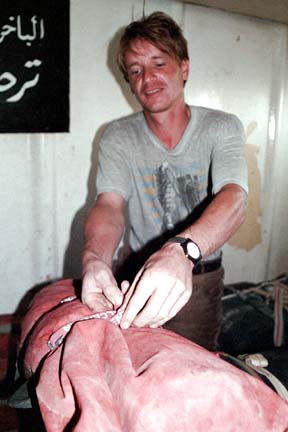
The German Marlboro Man on a Sudanese ferry? Was this a mirage?
He wasn't. He caught up with me shortly, when I bolted for the deck and the outside air.
"I'm going to take my sleeping bag out on deck later," he explained. "If I'm quiet, maybe they won't mind."
I decided then and there that I was joining him whether he liked it or not. Squalid hell would have to make do without me.
We scouted out the deck and found two crates to perch on.
"See that?" I pointed to the roof of the bridge. "It's Monkey Island. We'll sneak up there after dark."
He agreed to give it a try. Monkey Island, or the flying bridge, is only accessible by a ladder and it is always windy. Since we were the only two people on board with sleeping bags, we'd have no competition for Monkey Island.
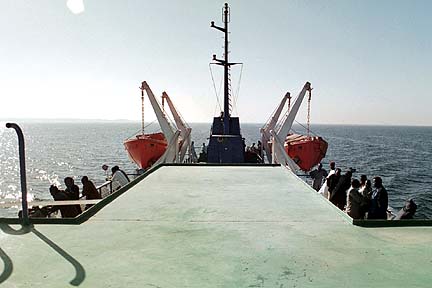
from Monkey Island
The Egyptian guy who'd talked to me at the Khartoum train station dropped by to relay the horrors of the train journey, and to practice English. He was polite enough to ask our names (something I'd quit doing months ago), and that is how I learned that Herr Marlboro's name was actually Werner.
Werner spoke passable Arabic and every Sudanese man on board seemed anxious to test it. He was immensely popular with his light hair, motorcycle, and Arabic. Relieved to be in the audience for a change. I sat and watched the banks of manmade Lake Nassar, created by damming the Nile at Aswan.
The call to prayer sounded after six, and the faithful gathered in a row to kneel towards Mecca. Due to physical space constraints, this meant we had a row of men chanting "Allah Akbar" at our feet. We kept quiet and tried not to giggle.
Werner tried the ferry food for dinner, and got a tray full of slop and poppadoms, while I ate tuna in curry mayo I'd made for myself back in Khartoum.
The Sudanese started turning in early. Piles of men in white cotton robes and hats littered the deck, curled up together like cats, presumably for warmth. One such pile of men lay at the bottom of the Monkey Island ladder.
"New plan," I said. "We're going to have to scale the wall." It wouldn't be difficult. The wooden crates put us halfway there.
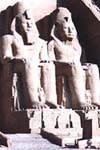
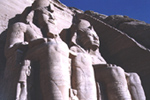
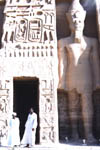
Photos of Abu Simbel from Marie's previous trip to Egypt
Werner and I stayed up until we passed Abu Simbel, with its magnificent tombs that had been saved by UNESCO in the 60's. The statues were lit at night, but were far away. The sight of them filled me with relief. We were in Egypt, land of the Pharaohs, the tourist, baksheesh, and the Big Mac. I was practically home.
We pushed our sleeping gear up to Monkey Island, and silently climbed up behind it. We were the only ones there. We unrolled our sleeping bags, covered our heads from the wind and went to sleep. Occasionally a gust of wind would jolt me awake. I'd poke my head out of my sleeping bag, look at the stars and the Nile, and then go back to sleep.
ASWAN TO CAIRO
NOVEMBER 22
A rustling woke me up.
"It's only one," said a German-accented voice.
The Marlboro Man was reaching for his Pepsi.
I raised myself up to my elbows and looked around. Forty pairs of eyes started up at me.
"They can see our feet! They're all staring at us," I exclaimed. Werner laughed.
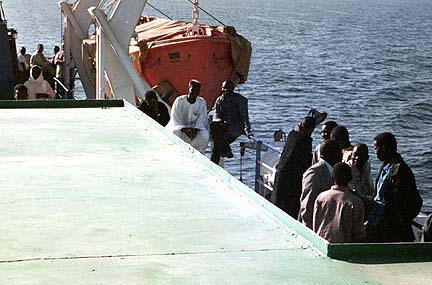
"They're all staring at us!"
"Let them watch our feet," he said. "That's no reason to get up."
I had a reason -- Werner's hootch, his bootleg Sudanese alcohol distilled from dates, was poking me in the back. I moved it to where his Pepsi was and relaxed back onto the steel deck.
"Did you hear the 4:30 call to prayer?" asked Werner. "It is like an alarm -- only two more hours until daylight."
We both rolled over so that our bodies blocked our actions -- we didn't want the Muslims to see us snacking on granola bars and cakes.
"How can they not eat all day?" I asked.
"In Sudan," explained Werner, "most of them sleep all day during Ramadan. Then they stay up all night."
That's one way around it, I thought.
"They can't even have water," he added. "That's why they use sticks to clean their teeth. No water, no toothpaste during Ramadan."
After a while, I asked him how old he was.
"35," he said. "But the African sun has aged me." It had aged me too, giving my skin a brown, leathery look. I had earned it and it was worth it, but my vanity was slightly concerned. I was glad to know that his was too.
Eventually, we packed up our sleeping bags and sat on them, facing forward so the crowd could see only our backs. We watched as Aswan's High Dam came into view.
"Werner," I said. "It's been a pleasure. You've made a potentially hellish trip a lot of fun."
"Likewise," he said. "I haven't had such a long conversation in months." He'd have plenty of long conversations in Munich, but in February would return to Sudan for a short-term assignment.
We climbed down the ladder and went to collect our bags and pack his motorcycle.
Peter Moore had sent me instructions for the ferry. (Buy his books from amazon.co.uk, they're funny.)
"In theory," he'd written, "you must wait six hours while all the Sudanese are processed. But I saw an Egyptian businessman getting off early. I protested and they left me off too."
I started in on the immigration officer as soon as he'd stamped my passport.
"I must catch a train very soon," I exaggerated. "Can I get off?"
"Five minutes," he replied.
Forty minutes later I inquired again. This time they let me off. Werner was still waiting. He'd be processed last because he was bringing a vehicle in.
He e-mailed me later.
"I am still in Aswan. They liked my motorcycle so they catched it."
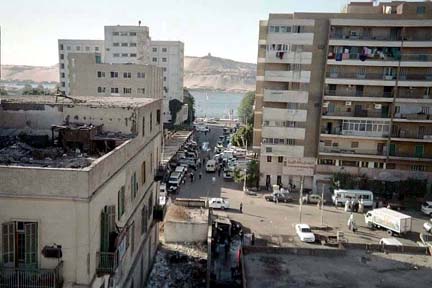
Aswan from the top floor swimming pool of Hotel Cleopatra
I catched myself a taxi to Thomas Cook to change money, and then to Hotel Cleopatra. For ten Egyptian pounds, they let me use their swimming pool. I did a few laps, but saved most of my energy for the attached hot shower. I sat and drank a Coke while looking at Aswan. It had developed a lot in the last three years, since my '99 Egypt trip. It even had internet cafes now. Aswan wore its new development well, I thought.
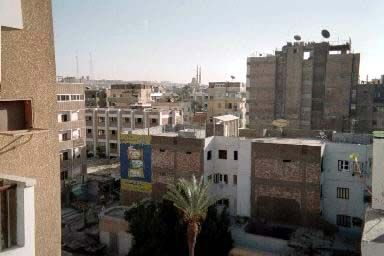
Aswan
At 6:30, I boarded the overnight train for Cairo. I remembered that coach class was filled with peddlers all night, and splurged on a private sleeper. The train attendant brought me my dinner -- my Thanksgiving dinner, I realized. It was chicken and rice, a suitable substitute for turkey. I devoured it with enthusiasm.
CAIRO TO TABA
NOVEMBER 23
My wayward Dragoman group was at Magic Hotel, "near the Hilton."

the remnants of the Dragoman group, in Cairo
I got in a taxi at the Cairo train station. By the time the driver asked "which Hilton," we were already underway, and it was too late for me to find a driver who'd heard of the Magic Hotel.
The driver groped my leg. Startled, I jumped.
"Sorry," he said. "So beautiful..."
"Gross," was my reply. "That's disgusting. You shouldn't touch tourists. Pull over. Let me out right now."
As luck would have it, he pulled over and I got out right in front of the tourist police and the Nile Hilton.
"You're disgusting," I announced, emboldened by the police presence. I refused to pay him and he fled quickly without argument.
The Hilton staff located the Magic Hotel for me -- it was just across the square, on the other side of the Egyptian Museum.
I walked into the lobby just as Monica came out of her room in her pajamas.
The rest of the group straggled out of bed and soon we were all chatting in the lobby.
The group was exhausted. They'd just flown in from Addis yesterday, and were boarding a new truck and leaving Cairo in the morning. They were burned out, and needed downtime but couldn't have it. The phrases "youyouyou" and "faranji" had the effect of reducing them to hysterics and I was relieved to have left Ethiopia sooner than the group.
Everyone split up for their single day of errand running, and I went off to send faxes and make phone calls. At lunchtime, I had the pleasure of making the acquaintance of a Mr. B. Mac, which was far more exquisite than it would have been under any other circumstances.
I said my final good-byes to everyone at the Magic. Trigger squeezed me hard, reminding me that my Isuzu wounds were still very much with me. Monica and I took our leave and went out to dinner.

Trigger opts to be in the "girls" photo
"All of Lalibela knew I'd been in the Isuzu," she said. People would whisper and point, and Mendes came to collect our fares."
"What?" I was aghast. Mendes had been part of the crew on the Isuzu. "They almost killed us and they wanted payment for the privilege?"
"I know!" she laughed. "Mark said the same thing! I wasn't going to pay but then I realized I was alone in Lalibela for days which those guys having access to me. I scared Mendes by getting up in his face. I told him to fuck off. He left in a hurry."
I paid for dinner to make up for my half of the Isuzu bill, and Monica put me in a taxi bound for the bus station. She'd be on a Dragoman truck for three more months, all the way to Kathmandu. She was excellent company and I'd miss her.
The taxi driver took me to Turgoman station, but first he made a wrong turn. He had no "reverse" gear and we had to push his cab back out into traffic.
I got on the 10:15 bus to the border at Taba, and tried to sleep. It was my third night of sleeping on public transportation but I still wasn't used to it.
"You're taking a bus?" Monica had said. "But your ribs..." Then she laughed, remembering that roads were paved in Egypt.
TABA TO TEL AVIV
NOVEMBER 24
The bus left me at the border, along with a Canadian couple with MTV hair and piercings. Leaving Egypt was a pain. The bored guards slowly examined my gear. I wanted to tell them to get a move on, but I'd woken up with a new problem. I couldn't speak.
I had, I suspected, the wind on Monkey Island to blame.
Exasperated, I dumped out everything in my bag and showed each item, piece by piece, to the border guard. He looked at me like I was insane and shoved me through.
I almost got teary when I saw the Israel "welcome" hall. I truly was now "out of Africa."
But first, I had a lot of hoops to jump through. The Customs inspector found me odd, but I was able to rasp out that I was traveling around the world. She let me pass.
The Passport Control officer had a much harder time with me.
"Uzbekistan, Malaysia, Sudan..." she paged through my passport. "Why so many Arab countries?"
She got a supervisor and they worked out my fate together. I worried in silence as I could not speak. If Israel denied me entry, I was in big trouble. My ship, originally leaving from Egypt, was now leaving from Ashdod south of Tel Aviv. I couldn't go by land to Europe, as Egypt had stamped me out at the Israeli border effectively invalidating my passport for travel to Israel-boycotting Syria.
Finally, most likely due to my being an American citizen with a New York address, I was stamped in. I walked down the road towards Eilat until a taxi showed up. He took me to an ATM and then dropped me off in the center of town. I stored my bags in a hostel locker, washed in Le Meridian hotel's posh bathroom, and went to find a bagel.
At two, I caught a bus to Tel Aviv.
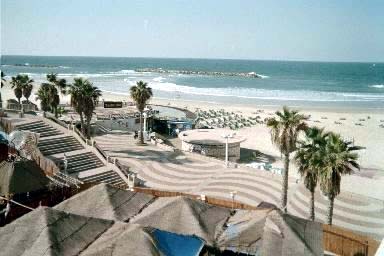
Tel Aviv
"Israeli's sure do beep a lot," I thought. Everyone had a mobile phone, and they seemed to ring incessantly.
The bus took us north through the desert. Wadi Rum was not far away, and the desolate, barren landscape here was identical to the desert just north of nearby Aqaba.
I bought two packs of cough drops and sucked on them for the five-hour trip to Tel Aviv.
A taxi took me to the Gordon Inn Guesthouse. The driver insisted on subjecting me to his opinions.
"All the problems in the world come from Muslims," he said. "All Israel's problems are the fault of Clinton and Barak, for trying to make peace with terrorists."
Itching to argue but realizing it was for the best that I had no voice, I checked into my hotel for a long, comfortable sleep.
TEL AVIV TO ASHDOD
NOVEMBER 25
The M/V Grande Scandinavia was not leaving until late, so I was able to do my laundry.
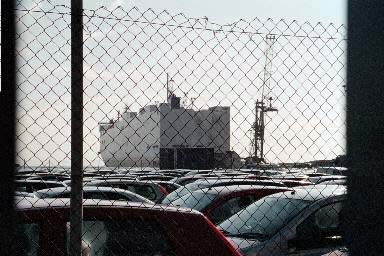
M/V Grande Scandinavia
My sleeping bag needed washing the most. The steel ferry deck had left its mark. While it was drying, I had a quick look around Tel Aviv.
Modern conveniences! Cheap anti-perspirant! Instant oatmeal, oil-free moisturizer, and a plethora of shampoos. These were not normally things I'd notice. But in Tel Aviv, I gaped open-mouthed at the volume of choice.
I took the number four bus back to the bus station, passing Starbucks and Tower Records on the way. On the sixth floor, near Burger King, I boarded a crowded bus for Ashdod. It was an hour away, and when I got there, a mall security guard instructed me to take the "number two" bus to the container terminal.
All public places have security guards in Israel. When you go to the grocery store, your handbag is inspected. Before you're allowed in a mall, someone looks you over.
I got off the bus at the container port and instantly stumbled across the offices of the shipping agent.
"Here is your ticket," said a man named Albert. I had to show the ticket at Immigration. Usually, I was able to walk right up to ships without being questioned. But in Israel, security was tight. Immigration granted me a shore pass, but kept my passport for the time being.
I carried my bags to Grimaldi's M/V Grande Scandinavia. Every ship I boarded, it seemed, was bigger than the last. But this ship, 56,000 tons worth of ship, was huge.
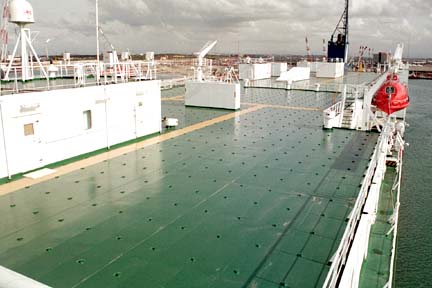
on deck
She was brand new and had only been in operation six months or so. I walked up a steel driveway -- the Grande Scandinavia was an automobile carrier -- and was greeted by Stefan, the chief (and only) steward.

one of the auto decks
Stefan was Bulgarian, as were several of the crew. The officers were Italian and Croatian. I wouldn't have any of my charming Russians to play with. But the cook, thank god, was Italian.
My cabin was small but clean and comfy. It was newer, but similar to all the other cabins I'd had this year. It had a bed, desk, bedside table, wardrobe, refrigerator, and bathroom. But on the Grande Scandinavia, the quarters were on floor number ten -- far away from the hot, loud engine below deck. My other ships didn't even have ten floors. She truly was a monster. A nice monster.

cabin no. 92
I left my bags in Cabin no. 92 and walked back across an enormous car-deck to the elevator. It whisked me back to sea level -- which was deck three, so maybe there were only seven decks after all -- and I went back into Ashdod for a quick look around.
When I arrived back at the ship, an Israeli port agent gave me a lift to the Grande Scandinavia.
"Where are you from?" he asked.
"New York."
"Ah," he said. "Maybe now you know how we feel."
Hmm. I'd have to think about that. I had no idea what it felt like to be an Israeli. I found the whole Israel-Palestine issue complex and confusing. No one was wholly right, and a lot of people on both sides were behaving poorly.
"Maybe," I replied.
I had tea with the Second Engineer -- I seem to naturally gravitate towards engineers. Then the Captain called for me.
"Is this your only ticket?" He was concerned that all I had was a fax.
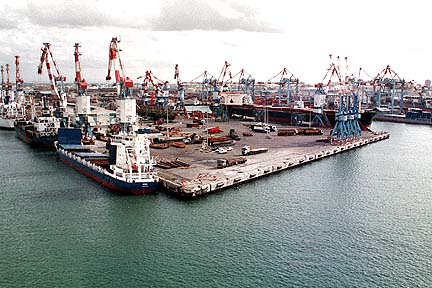
Ashdod port
"Yes," I replied. I'd never even seen a cargo ship ticket before today and was amused that everyone wanted to see it.
"And your passport?"
"Immigration has it. They said they'll bring it around tomorrow."
"Ah."
The Chief Mate came in, and the two joked about rough seas.
"But it's such a big ship," I exclaimed. "Does it really roll?"
"It is a big ship," agreed the Captain. "But the sea is bigger."
AT SEA
NOVEMBER 26 TO 28
Bill and Christine, a Scottish couple traveling on the Grande Scandinavia, gave me a tour. There were deck chairs, two laundry rooms, and a small gym in addition to the mess room and rec. room. Italian TV played non-stop in the rec. room -- the ship was often within broadcast range on its Mediterranean schedule.
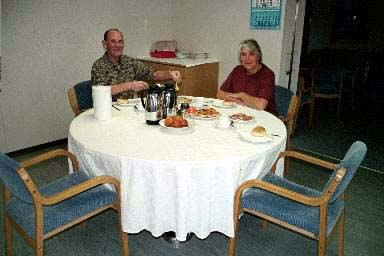
Bill and Christine
Meals were exceptional. The cook made his own pasta and pastries and wine was always provided with lunch and dinner.
Stefan caught onto my fish and dairy-free diet quickly and took rapidly to substitutions.
I'm embarrassed to admit that I was inordinately excited about pedestrian things.

engine room
I was thrilled, for example, to:
•brush my teeth in tap water
•do laundry when I felt like it
•eat loads of salad without fear.
I took advantage of sleeping four nights in one place and scrubbed the accumulated filth of four months in Africa out of my shoes and bag. I marveled at the cleanness of my clothes fresh out of the washing machine. I slept -- a lot -- and woke up in the morning dizzy and disoriented after coughing all night. My ribs still ached from the Ethiopian truck crash.
Did I have malaria? Were my truck accidents serious? I'd head to Rome to get a thorough checkup.
SALERNO TO ROME
NOVEMBER 29
We docked in Salerno, Italy, before light.
Over breakfast, Bill and Christine confessed they'd been laughing at the Second Engineer. They'd been on the ship for three weeks and hadn't known he could speak English until the night I'd boarded.
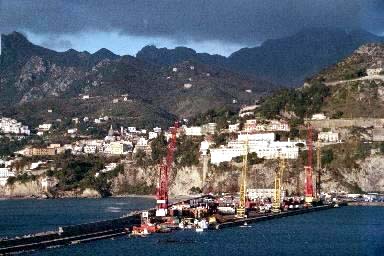
Salerno, Italy
"I try not to take all the cargo ship attention seriously," I explained. "I know it's been four months since they've seen a young woman."
Eventually, the Captain told me I was free to go. The Italians at the shipyard gate examined my luggage thoroughly. I was glad I'd done my laundry.
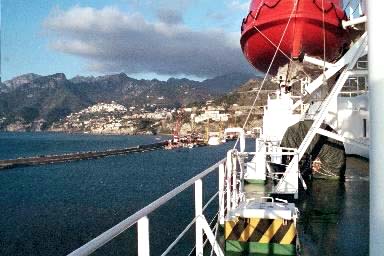
Salerno, Italy
I walked to town and went straight to the post office to send home my goatskin lunchbox and souvenirs. Europe and Italy looked inviting and convenient. I caught a train for Rome.
NEXT: All Roads Lead to Rome, and a doctor and a lot of medication. Rome, the Alps, Paris, Chartres, and Southampton.